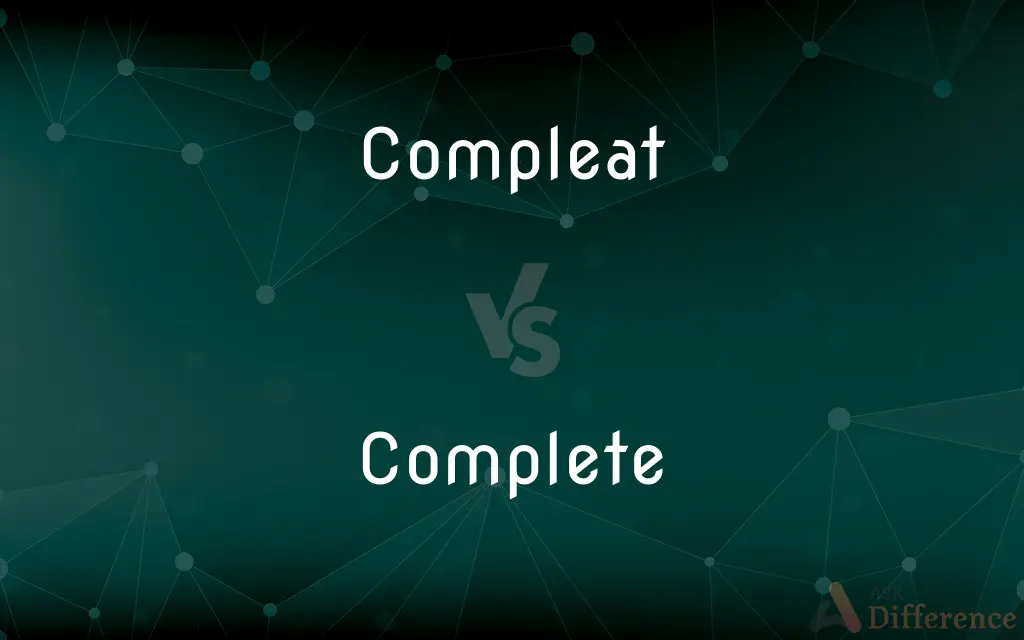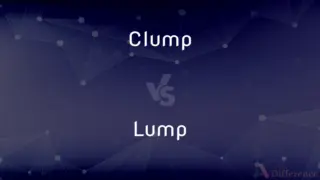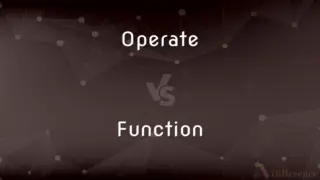Compleat vs. Complete — What's the Difference?
Edited by Tayyaba Rehman — By Fiza Rafique — Updated on March 15, 2024
"Compleat" is an archaic spelling of "complete," used historically to denote thoroughness, while "complete" is the modern term for something fully finished or whole.

Difference Between Compleat and Complete
Table of Contents
ADVERTISEMENT
Key Differences
"Compleat" is an archaic form of the word "complete," primarily seen in historical texts or used stylistically to evoke a sense of thoroughness or mastery, such as in the title "The Compleat Angler." It suggests not just completion, but a certain level of perfection or accomplishment in the context it's used. On the other hand, "complete" is the contemporary and widely accepted spelling used to describe something that is whole, finished, or lacking nothing. It is applicable in a broad range of contexts, from describing the status of a task to the extent of one's abilities.
The use of "compleat" today is largely stylistic or literary, chosen to impart an old-fashioned or classical tone to a text. It is rarely used in everyday language or formal writing, where "complete" is the standard choice. Meanwhile, "complete" is a versatile term that fits into various linguistic contexts, from technical descriptions to everyday conversation, indicating the totality or finality of something.
In terms of connotation, "compleat" carries with it an air of antiquity and perhaps a greater emphasis on the skill or comprehensiveness of an individual's abilities or knowledge in a particular area. For example, a "compleat scholar" might imply not just a well-rounded education but a mastery and depth of knowledge. Conversely, "complete" is more neutral, simply indicating that something has all its parts or has reached an endpoint.
"Compleat" might be seen in specialized titles or in the context of historical or literary discussions, evoking a sense of classical erudition or craftsmanship. "Complete," however, is used universally in modern English to indicate the entirety of an object, process, or concept, without the historical or stylistic connotations carried by "compleat."
The transition from "compleat" to "complete" in English usage reflects the evolution of the language, where "complete" emerged as the standard form due to its clarity and simplicity. While "compleat" remains a curiosity and stylistic choice, "complete" serves as the functional term for indicating wholeness or fullness in contemporary discourse.
ADVERTISEMENT
Comparison Chart
Spelling
Archaic form of "complete."
Modern and widely accepted spelling.
Usage
Used historically or stylistically for an old-fashioned tone.
Used universally in contemporary English.
Connotation
Implies thoroughness or mastery, with a classical tone.
Indicates something is whole, finished, or lacking nothing.
Context
Seen in historical texts or to evoke a classical feel.
Applicable in various contexts, from technical to everyday.
Example
"The Compleat Angler" is a classic literature title.
"The project is now complete."
Compare with Definitions
Compleat
An archaic spelling of "complete," suggesting thoroughness.
The library's collection is a compleat representation of English literature.
Complete
Fully finished or whole, lacking nothing.
The construction of the new bridge is complete.
Compleat
Indicates mastery in historical or literary contexts.
She is known as a compleat artist in the Renaissance style.
Complete
Indicates totality or finality in various contexts.
The agreement marks the complete cessation of hostilities.
Compleat
Associated with classical erudition or craftsmanship.
The exhibit displayed the works of compleat craftsmen of the 18th century.
Complete
Used universally in contemporary language.
His collection of novels is now complete.
Compleat
Often used stylistically to evoke a classical tone.
He considered himself a compleat gentleman of the old school.
Complete
Can describe the extent of abilities or qualities.
She is a complete professional, excelling in her field.
Compleat
Rarely used in modern formal writing.
The manuscript was a compleat study of ancient Greek philosophy.
Complete
Neutral, without historical or stylistic connotations.
The report provides a complete overview of the project's outcomes.
Compleat
Of or characterized by a highly developed or wide-ranging skill or proficiency
"The compleat speechwriter ... comes to anonymity from Harvard Law" (Israel Shenker).
Complete
Having all necessary or normal parts, components, or steps; entire
A complete medical history.
A complete set of dishes.
Compleat
Being an outstanding example of a kind; quintessential
"Here was the compleat modern misfit.
Complete
(Botany) Having all principal parts, namely, the sepals, petals, stamens, and pistil or pistils. Used of a flower.
Compleat
(LME) complete
Complete
Having come to an end; concluded
The renovation of the kitchen is complete.
Compleat
(LME) complete
Complete
Absolute; thorough
Complete control.
A complete mystery.
Complete
Accomplished; consummate
A complete musician.
Complete
(Football) Caught in bounds by a receiver
A complete pass.
Complete
To bring to a finish or an end
She has completed her studies.
Complete
To make whole, with all necessary elements or parts
A second child would complete their family. Fill in the blanks to complete the form.
Complete
(Football) To throw (a forward pass) that is caught in bounds by a receiver.
Complete
(ambitransitive) To finish; to make done; to reach the end.
He completed the assignment on time.
Complete
(transitive) To make whole or entire.
The last chapter completes the book nicely.
Complete
(poker) To call from the small blind in an unraised pot.
Complete
With all parts included; with nothing missing; full.
My life will be complete once I buy this new television.
She offered me complete control of the project.
After she found the rook, the chess set was complete.
Complete
Finished; ended; concluded; completed.
When your homework is complete, you can go and play with Martin.
Complete
Generic intensifier.
He is a complete bastard!
It was a complete shock when he turned up on my doorstep.
Our vacation was a complete disaster.
Complete
In which every Cauchy sequence converges to a point within the space.
Complete
In which every set with a lower bound has a greatest lower bound.
Complete
In which all small limits exist.
Complete
In which every semantically valid well-formed formula is provable.
Complete
That is in a given complexity class and is such that every other problem in the class can be reduced to it (usually in polynomial time or logarithmic space).
Complete
Filled up; with no part or element lacking; free from deficiency; entire; perfect; consummate.
Ye are complete in him.
That thou, dead corse, again in complete steelRevisit'st thus the glimpses of the moon.
Complete
Finished; ended; concluded; completed; as, the edifice is complete.
This course of vanity almost complete.
Complete
Having all the parts or organs which belong to it or to the typical form; having calyx, corolla, stamens, and pistil.
Complete
To bring to a state in which there is no deficiency; to perfect; to consummate; to accomplish; to fulfill; to finish; as, to complete a task, or a poem; to complete a course of education.
Bred only and completed to the tasteOf lustful appetence.
And, to complete her bliss, a fool for mate.
Complete
Come or bring to a finish or an end;
He finished the dishes
She completed the requirements for her Master's Degree
The fastest runner finished the race in just over 2 hours; others finished in over 4 hours
Complete
Bring to a whole, with all the necessary parts or elements;
A child would complete the family
Complete
Complete or carry out;
Discharge one's duties
Complete
Complete a pass
Complete
Write all the required information onto a form;
Fill out this questionnaire, please!
Make out a form
Complete
Having every necessary or normal part or component or step;
A complete meal
A complete wardrobe
A complete set pf the Britannica
A complete set of china
A complete defeat
A complete accounting
An incomplete flower
Complete
Perfect and complete in every respect; having all necessary qualities;
A complete gentleman
Consummate happiness
A consummate performance
Complete
Having all four whorls or principal parts--sepals and petals and stamens and carpels (or pistils);
Complete flowers
Complete
Highly skilled;
An accomplished pianist
A complete musician
Complete
Without qualification; used informally as (often pejorative) intensifiers;
An arrant fool
A complete coward
A consummate fool
A double-dyed villain
Gross negligence
A perfect idiot
Pure folly
What a sodding mess
Stark staring mad
A thoroughgoing villain
Utter nonsense
Complete
Having come or been brought to a conclusion;
The harvesting was complete
The affair is over, ended, finished
The abruptly terminated interview
Common Curiosities
Can "compleat" and "complete" be used interchangeably?
In modern usage, they are generally not interchangeable due to "compleat's" archaic and stylistic connotations.
Is "compleat" still used today?
While rare, "compleat" is occasionally used in literary, stylistic, or nostalgic contexts.
What is an example of "compleat" in literature?
An example is "The Compleat Angler" by Izaak Walton, a classic book on fishing.
What does it mean for something to be complete?
For something to be complete means it is fully finished, whole, and lacks nothing.
How is "complete" used in everyday language?
"Complete" is used to describe tasks, projects, collections, or processes that are fully finished or comprehensive.
Can a person be described as "complete"?
Yes, describing a person as "complete" can refer to their well-rounded abilities, character, or development.
What does "compleat" mean?
"Compleat" is an archaic spelling of "complete," often used historically or stylistically to suggest thoroughness or mastery.
Why is "compleat" used instead of "complete"?
"Compleat" is chosen over "complete" mainly for stylistic reasons, to evoke an old-fashioned or classical tone.
What is a "complete" work in literature?
A "complete" work in literature refers to a text that is fully finished and published, often in its final form.
Is "complete" a neutral term?
Yes, "complete" is a neutral term, simply indicating that something is whole or finished without additional connotations.
Share Your Discovery

Previous Comparison
Clump vs. Lump
Next Comparison
Operate vs. FunctionAuthor Spotlight
Written by
Fiza RafiqueFiza Rafique is a skilled content writer at AskDifference.com, where she meticulously refines and enhances written pieces. Drawing from her vast editorial expertise, Fiza ensures clarity, accuracy, and precision in every article. Passionate about language, she continually seeks to elevate the quality of content for readers worldwide.
Edited by
Tayyaba RehmanTayyaba Rehman is a distinguished writer, currently serving as a primary contributor to askdifference.com. As a researcher in semantics and etymology, Tayyaba's passion for the complexity of languages and their distinctions has found a perfect home on the platform. Tayyaba delves into the intricacies of language, distinguishing between commonly confused words and phrases, thereby providing clarity for readers worldwide.
















































